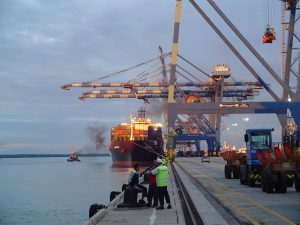The word may not be familiar to many, but cabotage – the right to operate sea, air, or other transport services within a particular territory – is an emotive political subject in many countries. This is certainly the case in Malaysia, where the central government’s cabotage policy has reopened old wounds dating back to the formation of the Malaysian Federation in 1963.
The problems hinge on the designation of Port Klang, located along the Straits of Malacca on the western side of the Malay peninsula, as the main container hub port in Malaysia, through which all international cargo traffic must pass. This has weakened distribution channels for local players in Sabah and Sarawak, Malaysia’s eastern states, which lie far off on the island of Borneo. The privileged position of Port Klang has led to increased freight rates to these eastern regions, which has in turn led to overpriced consumer goods. Poor management and the federal government’s lack of prioritization of eastern Malaysia’s economic development have been among the key factors. However, efforts to ameliorate these problems have been chiefly hampered by restrictions imposed by the nation’s cabotage policy.
To be sure, there have been recent some efforts to liberalize this policy. In 2017, the Malaysian government, under the Barisan National (BN) coalition, announced an exemption that would have allowed foreign vessels to land at Sabah’s ports. After the historic change of government in 2018, the new Pakatan Harapan (PH) government aimed to abolish the cabotage policy and end the artificial price difference between the east and the west, but to no avail. In April 2019, the waiver was further extended to allow foreign vessels to conduct submarine cable repairs and maintenance. Despite these efforts, however, the federal government has been unwilling to abrogate the cabotage policy, which has complicated efforts to equalize the treatment of east and west.
The friction between the east and the west goes back to the Malaysia Agreement 1963 or MA63, which, in essence, was an agreement made with Sabah and Sarawak during the formation of Malaysia. The underlying point of this agreement is that both states were “equal partners,” a special status that gave Sabah and Sarawak greater autonomy than the individual states of peninsular Malaysia. The two states were grated this status in recognition of the fact that they were administrated separately and were not part of the Federation of Malaya that was established in 1957.
However, despite being founding entities, a drastic change occurred in 1976 when Parliament successfully passed a bill to downgrade the status of Sabah and Sarawak. Since then, both states on Borneo have grown dissatisfied with the marginalization and denial of their “equal partnership” status in modern Malaysia. This dissatisfaction is particularly noticeable in the case of royalties from eastern Malaysia’s oil and gas industry. Together, the two states produce 60 percent of Malaysia’s oil and gas but receive only 5 percent of the royalties, with the remaining 95 percent of the revenue going to the federal government in Kuala Lumpur. Furthermore, a retraction of the cabotage exemption for submarine cable repairs, announced by Transport Minister Wee Ka Siong in November 2020, impacted local investments in the digital technology sector, causing further resentment.
Sabah and Sarawak’s most important advantage is their strategic location. Furthermore, the maritime proximity of Sabah’s Sepangar Bay and the towns of Lahad Datu, Sandakan, and Tawau to the Philippines offers significant economic opportunities for the state. The ongoing Sepangar Port expansion, due to be completed in 2024, offers particular benefits in terms of boosting Sabah’s economy.
Moreover, with Indonesia’s plan to move the capital of Jakarta to Kalimantan on Borneo, the island has the potential to transform itself into a maritime hub linking the Indian Ocean with the Pacific. This move, if it eventuates, will benefit the economic growth of both states. In a press conference on April 5, Tan Sri Pandikar Amin Mulia, Sabah’s special envoy to the Brunei, Indonesia, Malaysia, and Philippines East Asia Growth Area (BIMP-EAGA), an initiative aimed at boosting trade, tourism, and investments among the four maritime nations, stressed that maintaining the current cabotage policy will not only impede Sabah and Sarawak’s opportunity to grow economically but also, in the long term, might cause them to break away from Malaysia.
As it stands, Malaysia’s cabotage policy is a hindrance to Sabah’s intra-regional connectivity via the BIMP-EAGA initiatives. Brunei does not impose cargo restrictions. Indonesia has loosened up cabotage for activities such as oil and gas surveys, underwater work, and offshore activities. The Philippines allows foreign vessels to carry imported cargo if no Filipino vessels are available. Therefore, cabotage restrictions in Malaysia will reduce the connectivity from which Sabah would be likely to benefit. The freedom to carry both international and domestic cargo would help Sabah liberalize its economy and enhance investment and long-term growth.
Recently, there has also been a stronger pushback against the cabotage policy. On April 13, Malaysia witnessed a historic decision to hand over the administration of Sipadan and Ligatan islands to Sabah, and gas distribution management to Sarawak. This decision was made through a Special Council on MA63. In Sarawak, a different development took place when the Gabungan Parti-led Sarawak state government established the Sarawak Coast Guard on April 7, to enhance the safety and security of its waters in order to attract foreign investors to the state. This move was implemented under the state’s jurisdiction, showing the sort of autonomy that could be achieved under the original terms of MA63.
The gradual reclaiming of autonomy across these two states means that the promises of MA63 are, after decades, finally back on the negotiating table. Malaysia’s unity and solidarity as a maritime nation has, therefore, been undermined by the cabotage policy, the impacts of which now demand additional scrutiny from the federal government.

































